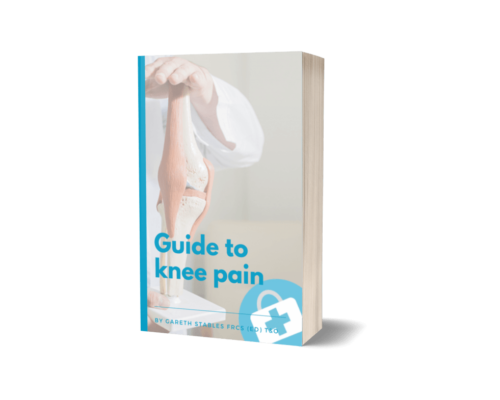Thigh Strength and Knee Osteoarthritis
Knee osteoarthritis is a cause of pain and disability for many people. Knee osteoarthritis hurts. More and more people are suffering with osteoarthritis of the knee, both men and women.
Lots of people with knee osteoarthritis have been shown to have thigh muscle weakness. Recent research suggests that leg strengthening exercises can lower your risk of developing osteoarthritis of the knee. So can thigh strengthening exercises protect your knee joints? In this blog I’ll try to answer that question.
How do we treat knee arthritis?
There are many causes of knee arthritis, and to date, there are no tablets or proven interventions that will prevent arthritis from getting worse. Therefore it is vitally important that everyone considers making changes to their lifestyle that minimizes their risk of developing knee osteoarthritis. I have talked in a previous blog post about the importance of exercise in helping manage the symptoms of knee arthritis. That post talked generally about the effects of exercise on inflammation and how to help control your symptoms. There is now growing evidence that you can prevent or decrease the risk of getting knee osteoarthritis by building up the strength in your thigh muscles.
What is Knee Osteoarthritis?
Osteoarthritis is a condition that leads to the loss of articular cartilage in your knee. The articular cartilage normally covers the ends of your bones in your knee joint and acts as a cushion or shock absorber. It is also very, very smooth (much smoother than even Teflon) and this allows your joint to move easily. When your cartilage is healthy, it is thick and strong, and your knee functions normally. When your cartilage becomes arthritic or damaged, it softens, and it becomes thinner. If your knee cartilage is softer and more delicate than it is supposed to be, your knee might start hurting you. Osteoarthritis also causes inflammation. That inflammation leads to swelling and it is the cause of pain in most cases of osteoarthritis.
The cartilage in your knee can wear away to the point that the bones of your knee might be touching one another. You might have heard people call this “bone-on-bone” arthritis. It’s at this point that your pain might be severe enough that you may need to consider treatments such as knee replacement surgery.
So if we can prove that strengthening your thigh muscles will decrease your risk of developing progressive, symptomatic osteoarthritis in your knee, you might be interested in starting your thigh building exercises today!
Thigh Strength Is Associated With a Decreased Risk of Symptomatic Osteoarthritis.
Many researchers over the years have performed various experiments to try and prove whether or not thigh weakness led to the development of symptomatic knee osteoarthritis. In women, weakness of the thigh muscles was found to be associated with a higher incidence of painful knee osteoarthritis
My previous blog post talked about how exercise is generally good for osteoarthritis. That hopefully explained how osteoarthritis is not simply a wear and tear process. I explained how the chemical changes brought on by exercise can improve knee pain.
Many scientists believe that thigh muscle strength decreases the risk of developing osteoarthritis of the knee . The precise reasons why exercise might reduce the risk of arthritic progression are still not fully understood. Knee arthritis is a very complex topic. There are 100s of chemicals, DNA changes, and hormones that can affect your articular cartilage, and the pain that you experience.
Strengthing your thigh muscles improves your stability, balance, and proprioception. All this has been shown to decrease your risk of injury. Knee injuries, especially injuries to your cartilage, increase your risk of developing osteoarthritis. Strengthening your muscles may decrease certain types of stress placed on your knee during different daily activities. Abnormal sliding movements are not well tolerated by the cartilage in your knee. These movements when one joint surface slides over another produces something we refer to as shear stress. Shear stress can lead to your cartilage breaking down and eventually to osteoarthritis. The stronger your legs are the better control you have over the amount of shear stress on your knee.
Thigh strength was associated with a decreased risk of arthritis progression after meniscus surgery
Recently researchers followed a group of their patients for more than ten years. All of these patients had a meniscus tear, which had been operated on.
Removing your meniscus is a known cause of osteoarthritis. After ten years, the researchers obtained follow up X-rays. They found that the patients who had the surgery but maintained strong thigh muscles had less arthritic changes in their knee when compared to those with weaker thigh muscle. If you are scientifically minded you should be asking whether this is a cause or association. We do not know the answer to that yet. In other words, did the stronger legs lead to a decrease in the risk of developing arthritis, or did those patients with less arthritis have stronger legs? However there are some take home messages
- Thigh strength improves how an arthritic knee feels. The stronger your legs are the less of a chance that you may require a knee replacement.
- Thigh strength is associated with a decreased risk of developing worsening arthritis after meniscus surgery
- Thigh strength has been shown to correlate with less painful knee arthritis.
Improving your thigh strength might well lessen your chances of developing severe osteoarthritis and hopefully help you avoid knee replacement surgery in the future.
About the author:
Mr. Gareth Stables MB ChB, FRCS (Ed) T&O
Cheshire Orthopaedic surgeon, Mr Gareth Stables, is a fully UK trained Consultant Orthopaedic Surgeon specialising in knee surgery. Gareth has the highest qualifications possible for an orthopaedic surgeon in the UK, FRCS (T&O), and is on the GMC specialist register for Trauma and Orthopaedic surgery.
Gareth specialises in; keyhole or knee arthroscopy surgery, ligament reconstruction surgery, knee osteotomy and knee replacement surgery.


